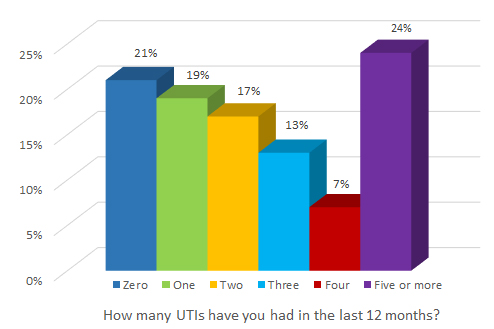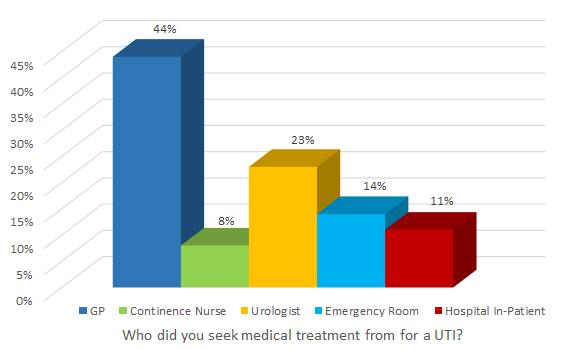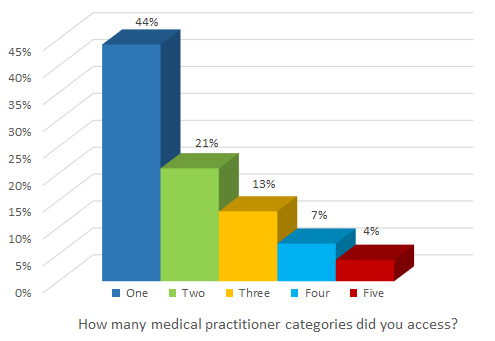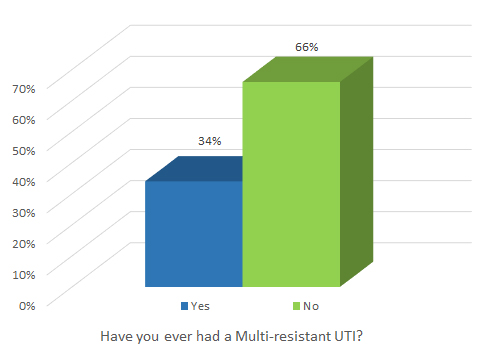Medical Treatment for UTIs
We asked Paralogic's UTI survey respondents about the frequency of UTIs as well as how often and from whom they seek medical help.
How many UTIs have you had in the last 12 months?

The results from our survey show that 92% of respondents reported having experienced a UTI and of those suffering infections, 44% of people reported having three or more infections in the previous 12 months (two infections in 6 months or three in 12 months is considered a recurrent UTI).
According to OUTBREAK (a multi-institutional and transdisciplinary initiative, led by the University of Technology Sydney), “UTIs affect 1 in 2 Australian women and 1 in 20 men in their life-time, currently resulting in more than 2.5-million GP appointments, 100,000 emergency department visits and 75,000 hospital stays each year. UTIs already cost Australia’s health system $909 million per year, not including indirect costs such as lost productivity.” (2020)
Who did you seek medical treatment from for a UTI?
92% of respondents reported having had a UTI and the same percentage have reported seeking medical treatment for a UTI. Respondents are overwhelmingly seeking medical advice for UTI treatment from GPs (44%) but are also reaching out to urologists (23%) Continence nurses (8%) and the hospital system (25%).

There were also a small group of people who reported seeking treatment from pain specialists, gynaecologists, urogynaecologists and infectious disease specialists.
Number of medical practitioner categories accessed?
Nearly half of respondents (47%) reported visiting a practitioner from more than one category, suggesting that patients are seeking treatment and advice from multiple sources. It is also worth mentioning that this does not include respondents who visited the same category of practitioner (i.e., their GP) multiple times. It is clear UTIs are a significant burden on patients and the medical system.

Multi resistant UTIs
A multi resistant UTI occurs when a bacterium causing the infection is resistant to more than one antibiotic. Multidrug-resistant bacteria can be difficult to treat, and they can also facilitate the spread of antibiotic resistance.
Have you ever had a Multi-resistant UTI?

Customer Stories – UTI complications
Many respondents reported having a range of UTI symptoms including a high fever, aches and chills, foul smelling urine, fatigue, blood in their urine, flank and back pain, inability or urgency to urinate and elevated temperatures. Reports were also common of memory confusion and dizziness. However, there were some stories shared by customers who had further complications caused by UTIs.
Overwhelmingly those who reported experiencing complications included details of a stay in hospital. One respondent shared that they have had multiple infections that resulted in blocked urine output. Another respondent shared that their infection progressed so quickly that they went into a coma for 5 days.
There were reports of uro-sepsis (sepsis caused by infections of the urinary tract). When uro-sepsis hits, timely care can result in substantial improvement within 48-72 hours, but often results in patients needing treatment for 2-3 weeks. Septicaemia (where bacteria enter the blood stream) was also a reported complication.
Autonomic dysreflexia (AD) is a sudden onset of excessively high blood pressure which can result in headaches, sweating, nausea and a slow heart rate (bradycardia). AD is common in people with spinal cord injuries that involve the nerves of the spine above the thoracic level (T6). AD is often precipitated by a bladder infection and was a commonly reported complication from UTIs in our survey.
Kidney scarring and infections, and in the case of a renal transplant patient, the reduction in kidney function, were also reported. UTIs have also led to such severe consequences as swelling of the cranial arteries, repeated thrush infections, bowel impaction from long term antibiotic use, and Pyelonephritis (kidney infection) that led to sepsis and pneumonia. It is also possible for UTIs to lead to the exacerbation of existing illnesses – patients with diabetes need to be particularly aware as one patient reported the effects of ketoacidosis following a UTI.
UTIs can leave behind urethral strictures (scaring of the urethra). One respondent reported a UTI caused an abnormal heart rhythm and another reported rigor that required an immediate ambulance transfer to hospital.
For men, UTIs can cause additional problems in the testicles with several reports of Epididymitis and Hydrocele. Epididymitis is an inflammation of the small, coiled tube at the back of the testicle and a hydrocele is swelling in the scrotum that occurs when fluid collects in the thin sheath surrounding a testicle.
Many of those who suffered complications reported that they now undertake extra precautions to prevent future recurrences. These include the UTI preventatives we talk about as well as maintaining a constant supply of antibiotics close to hand in case of further infection. But further reading shows that as people experience more infections, they become more in tune to what the start of an infection feels and looks like and seek help earlier.
 |
Return to the landing page for UTIs |
Comments (1)
fantastic solution
9 November 2021having to self cathater for a year and having that cause a stricture stopping urine i was given treatment to stretch the urethera . this was like having a baby i recon. pain pain pain. they wanted to repair my urethera and have me self catherise for life. i refused and demanded a suprapubic. it was the best thing i could have done. three years later i am born again. no infections, no pain, no discomfort. i suggest everyone with the problem gets a suprapubic cathater. i love it!
